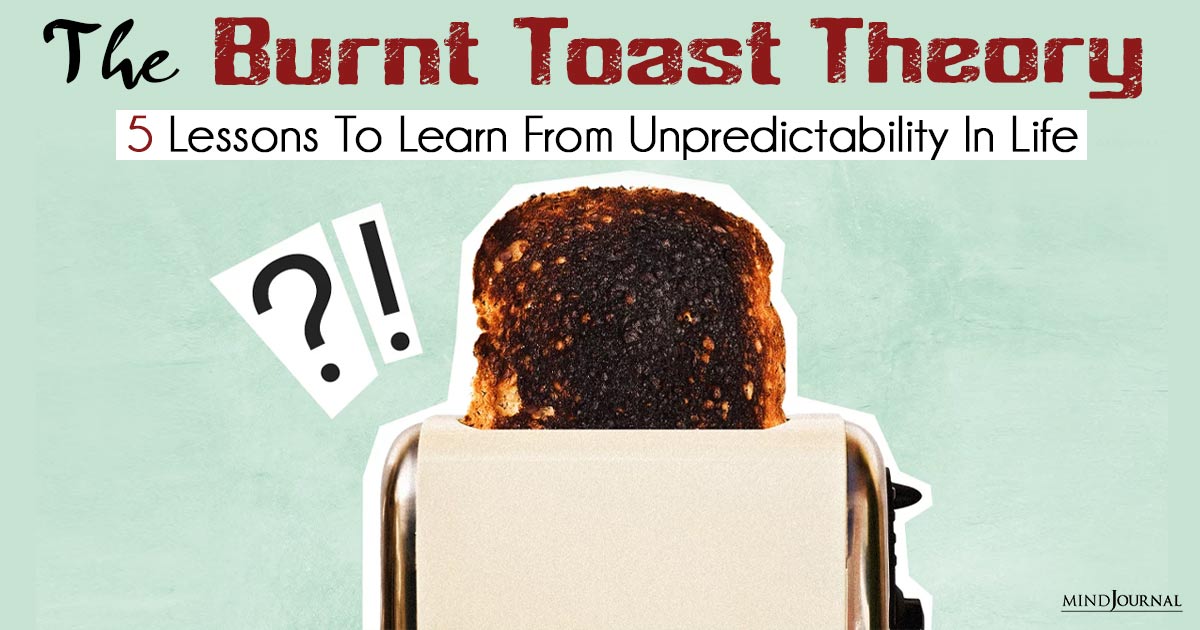Did you burn your morning toast this morning? As frustrating as it is, what if I told you that it might have protected you from something worse?
The Burnt Toast Theory of Life is a viral idea that has been floating around on TikTok and changes the way we look at life and has us accepting the curveballs of life!
What Is The Burnt Toast Theory of Life?
The “Burnt Toast Theory” is an allegory that is commonly used in self-help and motivational circles.
According to its creator Ingrid, when life hands us lemons (or burnt toast), it could be steering us away from things we don’t need in our lives or leading us towards something much better.
So rather than getting mad at a simple slice of bread, look at it as a metaphor for accepting things out of our control and not knowing what they may be saving up for you.

Related: How To Be Positive Everyday: 10 Tips For A Consistently Positive Mindset
Let’s break down how this simple yet relatable burnt toast theory can bring some positivity and resilience into our everyday routines.
1. Resilience is key
Life is nothing but setbacks. But embracing the Burnt Toast Theory lets us see these setbacks as stepping stones for growth and strength. Like Ingrid explains, “ever get irritated when you burn your toast? I do!
But then I’m like ‘wait… maybe that’s what saved me?’” Recognizing that challenges are part of life will make us more resilient when faced with them.
2. Stress no more
Embracing this theory means letting go of all the stress we feel when things don’t go according to plan. It encourages an optimistic outlook on negative events because instead of focusing on all the bad that happened, we look at the good it brought forth.
Changing how we think about hiccups will reduce stress and anxiety by allowing us to face them with more composure and positivity.
3. Learn something new every day
The Burnt Toast Theory introduces a growth mindset to our lives. Instead of seeing difficulty as permanent barriers, we’ll start embracing them for what they are: opportunities for learning and personal growth.
Reflecting on what went wrong and why can open our minds to insights we would have never seen before. Life then becomes a journey of constant learning where every setback is just another step towards being a better person.
4. Problem-solving king
Getting stuck in frustration whenever something bad happens is normal. But by accepting that maybe, just maybe, there’s something good hidden within setbacks, we’ll start getting creative with solutions and adapting to new situations.
The burnt toast then becomes the little push we need to look at challenges with a proactive mindset.
5. Say goodbye to negativity
Instead of going through each day filled with negative thoughts and an overall pessimistic outlook on life, the Burnt Toast Theory will help us see the glass half full rather than empty.
Life’s not about rumination and all the bad things that happen — it’s about taking lemons (or burnt toast) and using them as food for personal growth.
Related: 5 Simple Ways To Find ‘Awe’ In The Ordinary
The Takeaway
We take wrong turns in life at times, sometimes it’s as simple as setting the toaster on too high and burning our toast. Life may just be trying to remind us that invisible forces are steering you on the right path.
So next time life hands you some darkened bread, take a moment to think of all the positives it may be saving up for you — because trust me, they’re coming soon enough!
What is the burnt theory toast of life according to you? Do you believe it? Share your thoughts in the comments below!










Leave a Reply